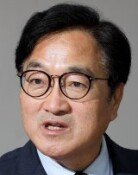OECD Criticizes Korean Housing Policies
OECD Criticizes Korean Housing Policies
Posted March. 05, 2007 07:05,
The Organization for Economic Cooperation and Development (OECD) has recommended the Korean government withdraw its policies to cap apartments prices built by private companies and to disclose apartment construction cost, which are expected to be passed in parliament, saying that the policies are against market principles.
The report also mentioned that the recent real estate policy by the Korean government needs to be coordinated more consistently with local growth policy, and that the governments policy regarding restrictions on the metropolitan area will hinder Korea from emerging as a core nation in Northeast Asia.
With regard to Vision 2030, a medium- to long-term financial plan by the government, the report said that Korean government should be prudent with expanding its welfare policy, considering the potential rise in spending pressures.
In a draft report on the economics of Korea in 2007, which Dong-a Ilbo obtained exclusively on March 4, the OECD pointed out the overall challenges that the Korean economy is facing, focusing on real estate policy and financial issues in particular.
The OECD is expected to announce its final report in April after consulting with Korean government officials this week in Paris, France, and going through a coordinating process.
The OECD report, drafted by its Economic Development Review committee, mentioned, Although Koreas housing price growth rate is average among other OECD members, the Korean government has been involved for too long in an intervention policy regarding short-term housing price hikes. It further pointed out that, Frequent policy changes by the government will worsen housing price fluctuations and curb demand.
In addition, it said, Koreas commitment to lowering housing prices by 20 percent through a price cap system on apartments built by private companies, and apartment construction cost disclosure are against market principles, and reported, This will dampen the will of companies to invest, which is based on expanding profit by reducing costs, and will eventually reduce the housing supply.
As for the tax system on real estate, including the comprehensive real estate tax, the report raised some equity issues about the distribution of wealth. It argued that using the real estate tax system as a tool to reallocate income goes against the principle of equity among other asset owners, such as stock investors and depositors.
Also, the report pointed out that the policies on restricting investment in the metropolitan area, such as restraining plant construction, are inconsistent with the Korean governments strategy of fostering the nation as a hub in Northeast Asia.
The recent policy on increasing the housing supply in the metropolitan area by the government is against the balanced growth policy of the incumbent government since the policy will concentrate more population in the metropolitan area.
Addressing this, the OECD draft report suggested, When implementing the local balanced growth policy, including building innovative cities and enterprise cities, the Korean government should give more authority to local government.
The OECD report added that because having a sound financial government position is getting important in the context of the aging population, the Korean government should take more prudent approaches about expanding its monetary policy for public welfare.







